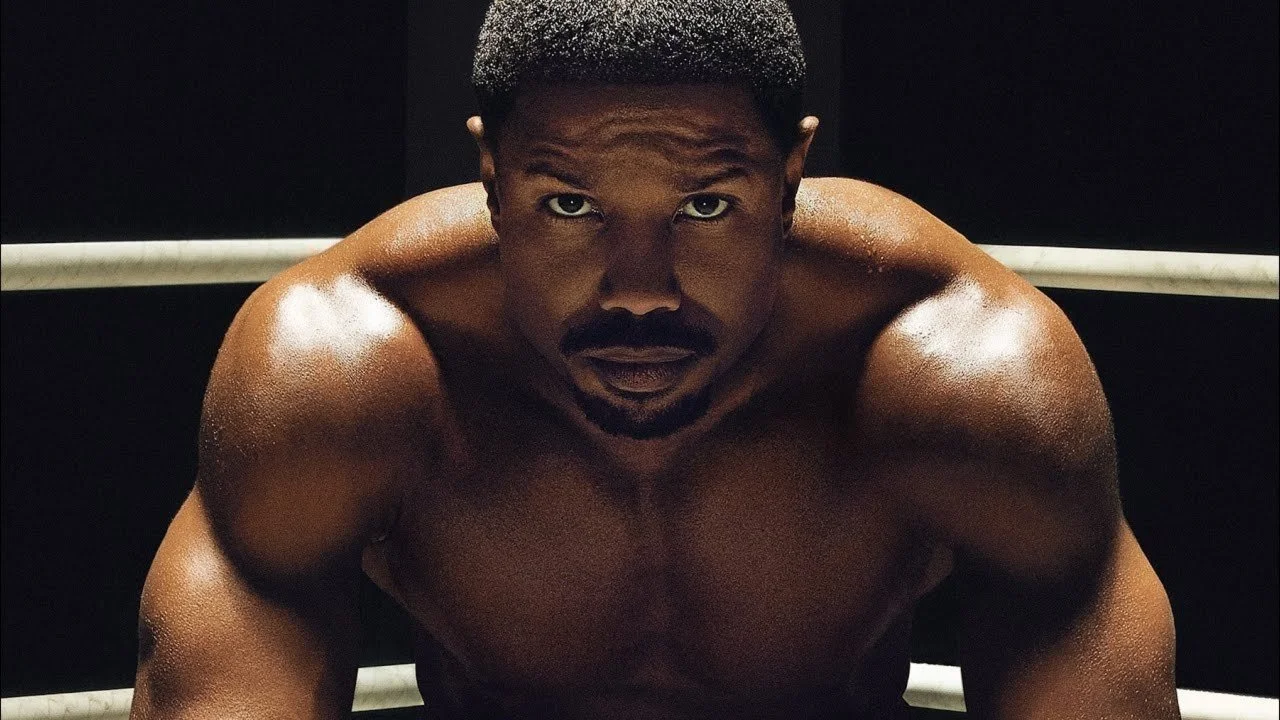Review: an evolved standard of masculinity in Creed III
Boxing is the quintessential sport of cinema. Of all major athletic arenas, it is the one that best lends itself to onscreen action: baseball is frequently muddled by obtuse psychological or moral agendas (e.g. Pride of the Yankees, The Natural), court and field sports like basketball or football don’t offer great opportunities for efficient or coherent visuals (Hoosiers, Friday Night Lights), and even seemingly direct, one-on-one sports like tennis or volleyball are complicated by the presence of a net.
Only boxing yields to the probing instincts of a movie camera — there’s one man, and another, with nothing standing between them. It’s conflict, pure and simple. There have been many popular films through the years to cite as pillars of the genre (The Champ, Body and Soul, Raging Bull, Million Dollar Baby), yet the most enduring title, or title-holder, if you will, is certainly Rocky, writer-star Sylvester Stallone’s Best Picture-winning 1976 drama about a hard-up Philadelphia underdog vying for world heavyweight championship.
Shrewd to say the least, Mr. Stallone milked that success for all it was worth across five tepid sequels. And then he came back for more, launching a spinoff trilogy with 2015’s Creed, in which Michael B. Jordan starred as Adonis, the eponymous progeny of Rocky’s infamous and deceased rival, Apollo. Despite heaps of praise and even an Oscar nod for the indomitable Balboa’s final bow, nothing about director Ryan Coogler’s revival of the franchise struck me as impressive or noteworthy at the time of its release.
How thrilling, then, to discover fertile ground in this, the triology’s final installment. Unlike its predecessors, Creed III discards with any baleful or scrappy crutches; it doesn’t drudge up woes from its hero’s circumstances to render his reach for glory inevitable, justified, or noble. Instead, it sets out to ask something a bit more probing — something that turns the notion of “pure conflict” on its head.
Naturally, the fighting sequences have punch, just as Mr. Jordan and his sparring partner, played by the consistently marvelous Jonathan Majors, are toweringly beautiful men of sculptural mascularity. But the most exciting thing about Creed III is its regard for quieter, more sensitive dimensions of manhood. In what is his first directorial effort, Jordan has utilized an aggressively macho platform to imagine and articulate an evolved standard of Black hetero-masculinity. By focusing on Adonis Creed’s efforts to reconcile events from his past concerning his old friend, Damien (Majors), with the present needs of his wife (Tessa Thompson) and daughter, Jordan and screenwriters Keenan Coogler and Zach Baylin integrate their protagonist’s established skills of physical self-expression with a dawning emotional intelligence.
In so doing, they undermine their genre’s conventions as well. Creed III isn’t so much a boxing film as it is an extended allegory for accessing and confronting trauma: Damien is Adonis’ alter ego, and his reemergence after being imprisoned for eighteen years is comparable to a childhood memory that has hitherto been repressed in the realm of the subconscious. When the film begins, Adonis has effectively retired; he no longer needs to exist in the survival mode that kept him focused and determined to become a champion. He can settle down, train a new crop of boxers, and be present for his family. His trauma — and, by extension, Damien — only comes to light after the conscious mind has allowed itself a period of rest.
Vulnerable, by letting his guard down, Adonis finally remembers what prompted him to strive toward impenetrability in the first place.
Mr. Jordan ought to be commended for his willingness to engage in such a conversation, just as he can take pride in his cinematic virtuosity. There’s a real eye for place and performance here, as cinematographer Kramer Morgenthau and editors Tyler Nelson and Jessica Baclesse align with their director’s careful gaze —lingering on a concerned face, or two hesitant bodies as they loom in a dimly-lit locker room. This also may be the best in-front-of-the-camera work I’ve seen from Jordan, whom I’ve historically considered to be a fairly untalented actor; he lights up during his scenes with Mr. Majors, and locates a touching sensitivity with Ms. Thompson as well.
In the end, perhaps unsurprisingly, fighting still wins out over humility in the ring. Adonis grows as a man, but not to the point where he can cede a match to someone who has challenged his pride. Creed III is satisfying genre filmmaking, subverting its narrative obligations while also remaining true to them. It promises us a brighter day ahead yet refuses to let this day rest without putting everything — and everyone — in its place.
We’re lucky to have people like Michael B. Jordan wielding influence and ideas in Hollywood. As of this writing, I’m firmly in his corner.
